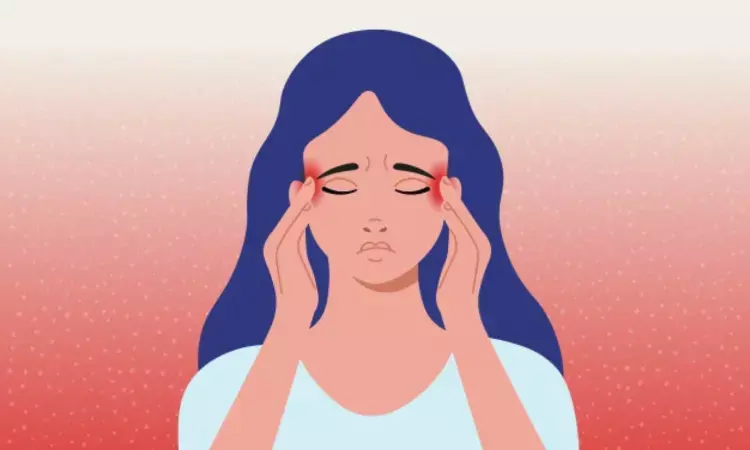- Home
- Medical news & Guidelines
- Anesthesiology
- Cardiology and CTVS
- Critical Care
- Dentistry
- Dermatology
- Diabetes and Endocrinology
- ENT
- Gastroenterology
- Medicine
- Nephrology
- Neurology
- Obstretics-Gynaecology
- Oncology
- Ophthalmology
- Orthopaedics
- Pediatrics-Neonatology
- Psychiatry
- Pulmonology
- Radiology
- Surgery
- Urology
- Laboratory Medicine
- Diet
- Nursing
- Paramedical
- Physiotherapy
- Health news
- Fact Check
- Bone Health Fact Check
- Brain Health Fact Check
- Cancer Related Fact Check
- Child Care Fact Check
- Dental and oral health fact check
- Diabetes and metabolic health fact check
- Diet and Nutrition Fact Check
- Eye and ENT Care Fact Check
- Fitness fact check
- Gut health fact check
- Heart health fact check
- Kidney health fact check
- Medical education fact check
- Men's health fact check
- Respiratory fact check
- Skin and hair care fact check
- Vaccine and Immunization fact check
- Women's health fact check
- AYUSH
- State News
- Andaman and Nicobar Islands
- Andhra Pradesh
- Arunachal Pradesh
- Assam
- Bihar
- Chandigarh
- Chattisgarh
- Dadra and Nagar Haveli
- Daman and Diu
- Delhi
- Goa
- Gujarat
- Haryana
- Himachal Pradesh
- Jammu & Kashmir
- Jharkhand
- Karnataka
- Kerala
- Ladakh
- Lakshadweep
- Madhya Pradesh
- Maharashtra
- Manipur
- Meghalaya
- Mizoram
- Nagaland
- Odisha
- Puducherry
- Punjab
- Rajasthan
- Sikkim
- Tamil Nadu
- Telangana
- Tripura
- Uttar Pradesh
- Uttrakhand
- West Bengal
- Medical Education
- Industry
Genetic links between migraine and blood sugar levels confirmed

In a study published in Human Genetics, QUT Professor Dale Nyholt and QUT PhD researcher Rafiqul Islam, describe using large-scale genome-wide associations studies (GWAS) summary statistics to analyse hundreds of thousands of human genomes from headache and migraine sufferers and non-sufferers.
Professor Nyholt, from the QUT Centre for Genomics and Personalised Health, said the co-occurrence of migraine and glycaemic (blood sugar levels) traits had been reported in observational epidemiological studies but it was unknown how they were genetically linked.
“About 15 per cent of the global population is affected by migraine and as far back as 1935 migraine was described as a ‘glycaemic headache’,” Professor Nyholt said.
“Glycaemic traits such as insulin resistance, hyperinsulinemia (too much insulin), hypoglycaemia (low blood sugar level) and type 2 diabetes are associated with migraine and headache.
“By identifying genetic correlations and shared loci and genes in our analyses we have inferred causal association and thus confirmed and improved understanding of the relationship between migraine, headache and glycaemic traits.”
Mr Islam said the researchers performed cross-trait analyses to estimate genetic correlation, identify shared genomic regions, loci, genes, and pathways, and then tested for causal relationships.
“Out of the nine glycaemic traits we looked at, we found a significant genetic correlation for fasting insulin (blood insulin level) and glycated haemoglobin with both migraine and headache, while two-hour glucose was genetically correlated only with migraine,” he said.
“We also found regions harbouring genetic risk factors shared between migraine and fasting insulin, fasting glucose, and glycated haemoglobin, and for headache, shared regions with glucose, fasting insulin, glycated haemoglobin, and fasting proinsulin.
“Further analyses produced evidence for a causal relationship between migraine and headache with multiple glycaemic traits.
“Our findings provide avenues to develop novel treatment strategies for managing glycaemic traits in migraine and headache patients, particularly increasing fasting proinsulin level to protect against headache.”
Reference:
Islam, M.R., The International Headache Genetics Consortium (IHGC). & Nyholt, D.R. Cross-trait analyses identify shared genetics between migraine, headache, and glycemic traits, and a causal relationship with fasting proinsulin. Hum Genet (2023). https://doi.org/10.1007/s00439-023-02532-6
Dr Kamal Kant Kohli-MBBS, DTCD- a chest specialist with more than 30 years of practice and a flair for writing clinical articles, Dr Kamal Kant Kohli joined Medical Dialogues as a Chief Editor of Medical News. Besides writing articles, as an editor, he proofreads and verifies all the medical content published on Medical Dialogues including those coming from journals, studies,medical conferences,guidelines etc. Email: drkohli@medicaldialogues.in. Contact no. 011-43720751


